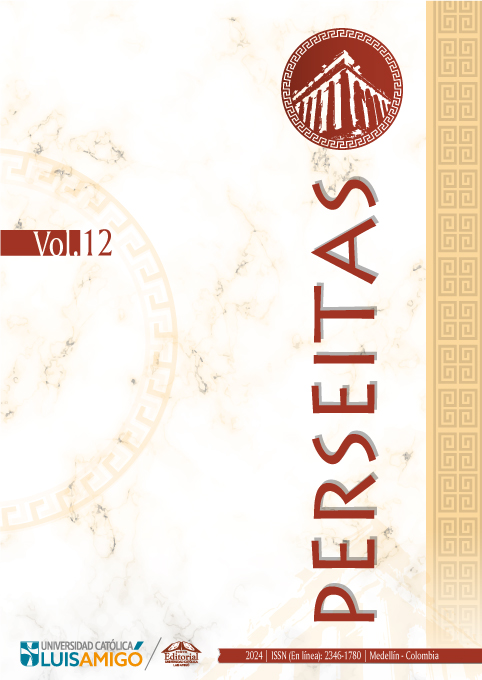Being God: the unio mystica according to Plotinus and his gnostic adversaries
DOI:
https://doi.org/10.21501/23461780.4649Keywords:
Gnosticism, Plotinus, Soul, Transfiguration, Transcendence, Unio MysticaAbstract
The experiences of unio mystica reached by Plotinus find their reflectionin the writings that Gnostic thinkers used in their discussions with him in Rome, as described by Zostrianos (NH VIII, 1) and Allogenes (NH XI, 3). Despite this philosophical rivalry, it is possible to find similarities between the testimonies if we analyze these experiences through their relationship with the Altered States of Consciousness (ASC), a concept proposed by the Psychology of Religion. Both the philosophical corpus and the Gnostic tradition describe this particular state of the soul (ψυχἠ) in detail when outlining the mystical process.In this process, both testimonies emphasize the profound change in the initiate’s consciousness itself, although Neoplatonists and Gnostics differ in the limits on the level of identification with the divinity.
Then, through textual and philological analysis, we will focus this paper on the study of the unio mystica in two aspects. In the first place, in the process itself followed by the initiate. In the second place, in the extent of union or contact of the visionary-initiate with the Absolute or the divinity. This analysis will highlight the common paths that both schools of thought promoted in their search for the transcendent, while at the same time will rise essential questions about this process that will clearly define the differences between them.
Downloads
References
Allogène (NH XI, 3) (M. Scopello & J. D. Turner, Trads.). (2007). En J. P. Mahé & P. H. Poirer (Dirs.), Écrits Gnostiques [Escritos gnósticos] (pp. 1535−1574). Gallimard.
Allógenes (NHC XI 3) (J. Montserrat Torrents, Trad.). (2000). En A. Piñero, F.García Bazán & J. Montserrat Torrents (Eds.), Textos gnósticos. Biblioteca de Nag Hammadi I: Tratados filosóficos y cosmológicos (pp. 305−321). Trotta.
Burns, D. (2015, junio 21-26). The Gnostic Apocalypses and Early Jewish Mysticism [Los apocalipsis gnósticos y el misticismo judío temprano] [Conferencia]. Enoch Seminar Apocalypticism and Mysticism, Villa Cagnola, Gazzada, Italia. http://enochseminar.org/enoch-seminars/milan-2015
Charrue, J.-M. (2003). Note sur Plotin et la mystique [Nota sobre Plotino y la mística]. Kernos, 16, 197−204. http://kernos.revues.org/824
Crum, W. E. (1962). A Coptic Dictionary [Diccionario copto] (2nd ed.). Clarendon Press.
DeConick, A. (2015, junio 21-26). Traumatic Mysteries. Modes of Mysticism among the Early Christians [Misterios traumáticos. Modos del misticismo entre los cristianos primitivos] [Conferencia]. Enoch Seminar Apocalypticism and Mysticism, Villa Cagnola, Gazzada, Italia. http://enochseminar.org/enoch-seminars/milan-2015
Diez de Velasco, F. (1997). Un problema de delimitación conceptual en historia de las religiones: la mística griega. En D. Plácido, J. Casillas & C. Fornis Vaquero (Coords.), Imágenes de la polis (pp. 407− 422). Ediciones clásicas.
García Bazán, F. (2011). Plotino y la mística de las tres hipóstasis. El hilo de Ariadna.
Gómez Sánchez, C. (2012). Psicología y religión. En F. Diez de Velasco & F. García Bazán (Eds.), El estudio de la religión (2a ed.) (pp.147−172). Trotta.
Hermoso Félix, M. J. (2022). Individualidad y conciencia en Plotino. Tópicos, Revista de Filosofía, (63), 303−332. https://doi.org/10.21555/top.v63i0.1961
Jámblico. (1997). Sobre los misterios egipcios (E. A. Ramos Jurado, Trad.). Gredos. (Obra original publicada s.f.)
Iamblichus. (2003). On the Mysteries [Sobre los misterios] (E. C. Clarke, J. M. Dillon & J. P. Hershbell, Trads.). Society of Biblical Literature. (Obra original publicada en ca. 280 y 300 d.C.)
Las tres estelas de Set (NHC VII 5). (2000). En A. Piñero F. García Bazán & J. Montserrat Torrents (Eds.), Textos gnósticos. Biblioteca de Nag Hammadi I: Tratados filosóficos y cosmológicos (pp. 259−274). Trotta.
Les Trois Stèles de Seth (NH VII, 5) [Las tres estelas de Seth (NH VII, 5)] (P. Claude, Trad.). (2007). En J. P. Mahé & P. H. Poirer (Dirs.), Écrits Gnostiques [Escritos gnósticos] (pp. 1219-1246). Gallimard.
Orlov, A. (2015, junio 21-26). A Farewell to the Merkavah Tradition [Adios a la tradición de la Merkavá] [Conferencia]. Enoch Seminar Apocalypticism and Mysticism, Villa Cagnola, Gazzada, Italia. https://www.marquette.edu/maqom/farewell55.pdf
Philo of Alexandria. (1988). On the change of names (de mutatione nominum) [Sobre el cambio de nombres] (F.H. Colson & G. H. Whitaker, Trads.). En G. P. Goold (Ed.), Philo volumen V [Filón volumen V] (pp. 126-281). Harvard University Press-William Heinemann. (Obra original s.f.)
Platon. (1988). Díalogos V. Parménides,Teeteto, Sofista, Político (Ma. I. Santa Cruz, A. Vallejo Campos & N. L. Cordero, Trads.) Gredos. (Obra original publicada entre 368-367 a.C.)
Plotino. (1985). Enéadas III-IV (J. Igal, Trad.). Gredos. (Obra original publicada entre 254-270 d.C.)
Plotino. (1998). Enéadas V-VI (J. Igal, Trad.). Gredos. (Obra original publicada entre 254-270 d.C.)
Plotin. (2002a). Traité 2 (IV, 7). Sur l’inmortalité de l’âme [Tratado 2 (IV, 7). Sobre la inmortalidad del alma]. En L. Brisson & J. F. Pradeau (Eds.), Plotin, traités 1-6 [Plotino, tratados 1-6] (pp. 93−140). Flammarion. (Obra original publicada entre 254-262 d.C.)
Plotin. (2002b). Traité 6 (IV, 8). Sur la descente de l’âme dans les corps [Tratado 6 (IV, 8). Sobre el descenso del alma en el cuerpo] (L. Lavaud trad.). En L. Brisson & J. F. Pradeau (Eds.), Plotin, Traités 1-6 [Plotino, tratados 1-6] (pp. 229−269). Flammarion. (Obra original publicada entre 254-262 d.C.)
Plotin. (2003a). Traité 9 (VI, 9). Sur le Bien ou l’Un [ Tratado 9 (VI, 9). Del Bien o el Uno] (F. Fronterotta, trad.). En L. Brisson & J. F. Pradeau (Eds.). Plotin, traités 7-21 [Plotino, tratados 7-21] (pp. 55−131). Flammarion. (Obra original publicada entre 254-262 d.C.)
Plotin. (2003b). Traité 19 (I, 2). Sur les vertus [Tratado 19 (I, 2). De las virtudes] (J. M. Flamand trad.). En L. Brisson & J. F. Pradeau (Eds.), Plotin, traités 7-21 [Plotino, tratados 7-21] (pp. 417−465). Flammarion. (Obra publicada originalmente entre 254-262 d.C.)
Plotin. (2004a). Traité 22-23 (VI, 4-5). Sur la raison pour laquelle l’être, un et identique, est partout tout entier [Tratados 22-23 (VI, 4-5). Que el ser, siendo uno e idéntico, está todo a la vez y en todas partes] (R. Dufour, trad.). En L. Brisson & J. F. Pradeau (Eds.), Plotin, traités 22-26 [Plotino, tratados 22-26] (pp. 11−97). Flammarion. (Obra publicada originalmenteentre 263-268 d.C.)
Plotin. (2004b). Traité 24 (V, 6). Sur le fait que ce qui est au-delà de l’être n’intellige pas, et sur ce que sont les principes premier et second de l’intellection [Tratado 24 (V, 6). Que lo que está más allá del ser no piensa y cuáles son los principios primero y segundo de la intelección] (L. Lavaud, Trad.). En L. Brisson & J. F. Pradeau (Eds.), Plotin, traités 22-26 [Plotino, tratados 22-26] (pp. 99-128). Flammarion. (Obra publicada originalmente entre 263-268 d.C.)
Porfirio. (1982). Vida de Plotino/Plotino, Enéadas I-II (J. Igal, Trad.). Gredos. (Obra original publicada ca. 270 d.C.)
O’Meara, D. J. (1993). Plotinus: An Introduction to the Enneads [Plotino: una introducción a las Enéadas]. Clarendon Press.
Randolph-Seng, B. (2014). Altered states of consciousness [Estados alterados de conciencia]. En D. A. Leeming, K. Madden & S. Marlan (Eds.), Encyclopedia of Psychology and Religion [Enciclopedia de psicología y religión] Springer. https://doi.org/10.1007/978-1-4614-6086-2_21
Rubia Vila, F. J. (2012). Religión y cerebro. En F. Diez de Velasco & F. García Bazán (Eds), El estudio de la religión (pp.173−194). Trotta.
Schäfer, P. (2009). The Origins of Jewish Mysticism [Los orígenes del misticismo judío]. Mohr-Siebeck.
Trouillard, J. (1961). Valeur critique de la mystique plotinienne [Valor crítico de la mística plotiniana]. Revue philosophique de Louvain, (63), 431−444. https://www.persee.fr/doc/phlou_0035-3841_1961_num_59_63_5084
Velasco, J. M. (2003). El fenómeno místico (2a ed.). Trotta.
Yepes Muñoz, W. A. (2019). La filosofía como una mística de acogida. Una lectura de la filosofía y la mística en Plotino y Pierre Hadot. Perseitas, 8, 104–122. https://doi.org/10.21501/23461780.3503
Zostrien (NH VIII,1) (C. Barry & J. D. Turner, Trad.). (2007). En J. P. Mahé & P. H. Poirer (Dirs.), Écrits Gnostiques [Escritos gnósticos] (pp. 1247-1320). Gallimard. (Obra original s.f.)
Zostrien (NH VIII, 1) (BCNH 24) (C. Barry, W. P. Funk, P-H. Poirer & J. D. Turner, Trads.). (2000). Les Presses de l’Université Laval–Peeters.
Zostriano (NHC VIII 1) (F. Bermejo, Trad.). (2000). En A. Piñero (Ed.), Textos gnósticos. Biblioteca de Nag Hammadi I: Tratados filosóficos y cosmológicos (pp. 275−304). Trotta. (Obra original s.f.)
Published
How to Cite
Issue
Section
License

This work is licensed under a Creative Commons Attribution-NonCommercial-NoDerivatives 4.0 International License.
La revista y los textos individuales que en esta se divulgan están protegidos por las leyes de copyright y por los términos y condiciones de la Licencia Creative Commons Atribución-No Comercial-Sin Derivar 4.0 Internacional.
















